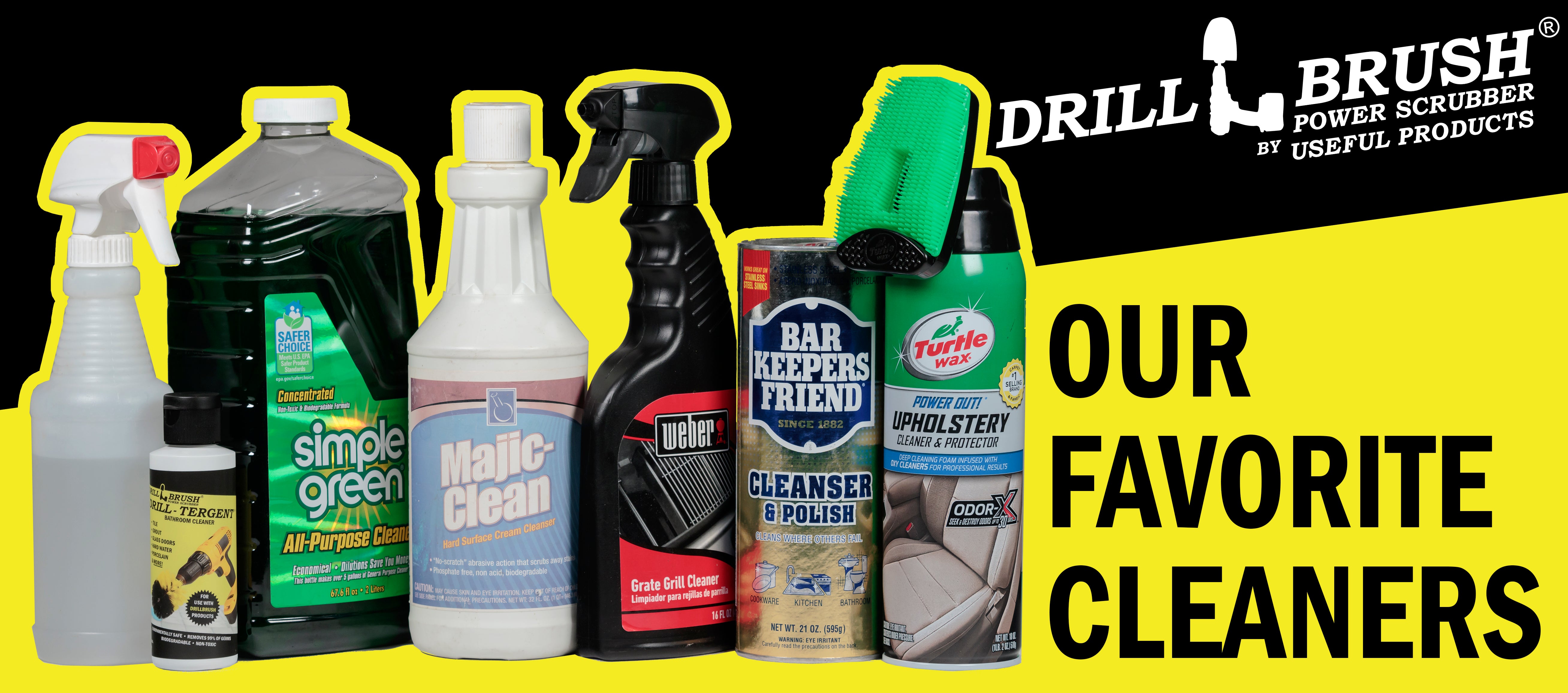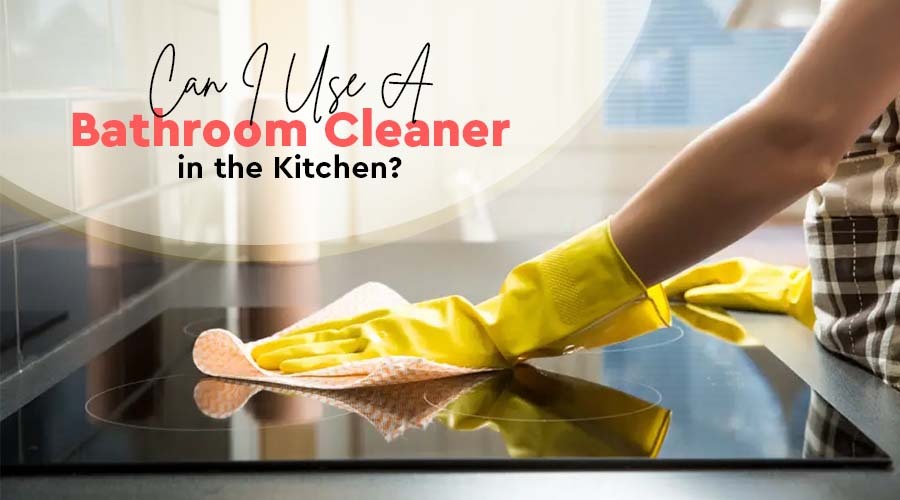Yes, you can use bathroom cleaner in the kitchen, but only on non-food contact surfaces. It is essential to choose a cleaner that’s suitable for the specific kitchen surfaces and materials you’ll be cleaning.
Maintaining cleanliness in the kitchen is crucial for hygiene and health. Using an effective cleaner helps ensure that surfaces are free from bacteria and grime. Bathroom cleaners are formulated to tackle soap scum, mold, and bacteria, making them powerful allies against kitchen messes as well.
While these cleaners can be potent, it’s important to consider their chemical composition. Some ingredients may be too harsh for delicate kitchen surfaces like marble or granite. Always read the label for safety instructions and surface compatibility before application. A tidy and sanitized kitchen contributes to a safe cooking environment, reducing the risk of cross-contamination and foodborne illnesses. Remember, never apply bathroom cleaner directly onto areas where food preparation takes place.

Introduction To Cleaning Agents And Their Use
Cleaning agents help us keep our homes fresh and sanitized. It’s essential to understand what products work best in different areas of our houses. Can you use a bathroom cleaner in the kitchen though? Let’s explore the effectiveness and safety of cleaning agents for various home environments.
Understanding The Components Of Cleaning Products
Every cleaner has a unique formula designed for specific tasks. The key components in these products include:
- Surfactants for breaking down dirt
- Acids or Bases to tackle tough residues
- Disinfectants for killing germs
- Fragrances to leave a pleasant scent
These ingredients vary in concentration, making some cleaners more suitable for certain surfaces and rooms than others.
Overview Of Bathroom Cleaners And Their Intended Use
Bathroom cleaners are armed with particular chemicals aimed at restroom-based grime, like soap scum and water stains. Often, these solutions include:
- Mold fighters for damp areas
- Limescale removers for mineral buildup
- Chemicals that combat hard water effects
Their specialized nature targets bathroom surfaces like tile, porcelain, and glass.
Multi-purpose Versus Specific-use Cleaners
Multi-purpose cleaners serve as a jack-of-all-trades, performing reasonably well across various surfaces and rooms. In contrast, specific-use cleaners address particular problems in targeted areas, like the bathroom.
The choice between these two depends on the cleaning task at hand:
| Multi-Purpose Cleaners | Specific-Use Cleaners |
|---|---|
| Good for general cleaning | Designed for specific challenges |
| Safe on multiple surfaces | May harm surfaces not meant for |
Mixing them is not advisable since it can lead to harmful chemical reactions.
Safety And Effectiveness Of Bathroom Cleaner In The Kitchen
Exploring the safety and effectiveness of using bathroom cleaner in the kitchen sparks curiosity. Many households ponder whether it’s safe to apply products designed for bathroom tiles and toilets to kitchen countertops and stoves. Understanding the chemical makeup, efficacy against typical kitchen messes, and health implications is crucial for informed decisions.
Chemical Composition And Its Impact On Kitchen Surfaces
Bathroom cleaners often contain potent chemicals, some harsher than those in kitchen cleaners. Ingredients like bleach or ammonia are common. These substances can disinfect but may also harm sensitive kitchen surfaces.
- Stone Countertops: Acidic cleaners can etch marble or granite.
- Appliance Exteriors: Abrasive formulas could scratch stainless steel.
- Wood Surfaces: Chemicals might strip varnish or damage finishes.
Efficacy Of Bathroom Cleaners On Common Kitchen Grease And Grime
While bathroom cleaners are tough on soap scum and mildew, kitchen messes differ. Grease, food spills, and baked-on residue present unique challenges.
| Cleaning Task | Bathroom Cleaner Effectiveness |
|---|---|
| Greasy Stovetops | May require multiple applications |
| Food Spills | Not optimal for sticky residues |
| Burnt Pans | Limited impact on charred surfaces |
Health And Safety Considerations When Using Bathroom Cleaners In Food Areas
Kitchen surfaces come in contact with food items. Using bathroom cleaners carries risks. They may leave behind harmful residues.
- Always rinse kitchen surfaces thoroughly after cleaning.
- Avoid cleaners with toxic fumes in confined spaces.
- Consider potential allergic reactions or sensitivities.
Remember to ventilate the area well and wear gloves for protection. Opt for products labeled safe for food-contact surfaces or favor mild dish soap and water.
Best Practices For Cleaning Your Kitchen
Keeping your kitchen clean is essential for a healthy home. The right products and methods can ensure that your kitchen remains hygienic, sparkling, and safe for preparing meals. Discover the best ways to select the appropriate cleaner for different surfaces, safely use those products, and explore DIY cleaning solutions. Let’s dive into the best practices for a pristine kitchen environment.
Selecting The Right Cleaner For Kitchen Surfaces
The kitchen is home to various surfaces, from countertops to stovetops. Choosing the right cleaner is crucial for both hygiene and surface longevity.
- Countertops: Opt for gentle, non-abrasive cleaners.
- Appliances: Stainless steel requires a specialized cleaner to prevent streaks.
Tips For Safely Using Cleaning Products In The Kitchen
Using cleaning products safely is vital to prevent contamination and accidents.
- Read labels before use.
- Ventilate the area by opening windows.
- Wear gloves to protect your skin.
Diy Alternatives And Natural Solutions For Kitchen Cleaning
Natural solutions can be effective and safe for cleaning your kitchen.
| Ingredient | Use |
|---|---|
| Vinegar | Disinfects surfaces |
| Baking Soda | Removes tough stains |
Summarizing The Appropriateness Of Bathroom Cleaners In The Kitchen
Using bathroom cleaners in the kitchen can be suitable sometimes. Ingredients matter most. Some are safe while others are not. Products designed for soap scum may not be for food prep surfaces. Always check labels.
Final Recommendations For Maintaining Hygiene In The Kitchen
- Choose cleaners that list kitchen use.
- Prefer gentle, food-safe options.
- Disinfect surfaces regularly.
- Keep separate sponges and cloths for different tasks.
Further Resources For Safe And Effective Home Cleaning
Stay informed for a safe, sparkling home. Refer to these:
- Product websites for ingredient lists.
- Cleaning expert blogs.
- EPA guidelines for safe kitchen cleaners.

FAQs For Bathroom Cleaner In The Kitchen
Can You Use Foaming Bathroom Cleaner In The Kitchen?
Yes, you can use foaming bathroom cleaner in the kitchen. Ensure it’s safe for your specific kitchen surfaces and rinse thoroughly after use.
What Is Difference Between All Purpose Cleaner And Bathroom Cleaner?
All-purpose cleaners are versatile, suitable for multiple surfaces, whereas bathroom cleaners specifically target bathroom grime, mold, and soap scum.
Which Is Cleaner Bathroom Or Kitchen?
Kitchens typically harbor more bacteria than bathrooms, especially near sinks and countertops where food preparation occurs. Regular cleaning is essential for maintaining hygiene in both spaces.
Can Lysol Toilet Cleaner Be Used On Countertops?
Lysol toilet cleaner is not recommended for countertops. Use products specifically designed for kitchen surfaces instead.
Conclusion
Choosing the right cleaner for your home’s diverse surfaces is essential. Bathroom cleaners, while powerful, may not always be suitable for kitchen use due to differing textures and food safety concerns. Remember to prioritize products designed for kitchens to maintain both cleanliness and health standards.
Always read labels and follow manufacturer guidelines for a sparkling, safe home environment.
